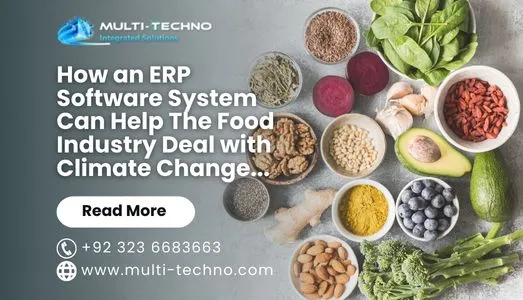Multi-Techno Integrated Solution

Table of Contents
ToggleHow an ERP Software System Can Help the Food Industry Cope with Climate Change
In a world where climate change poses significant challenges to industries across the globe, the food sector stands at the forefront of both impact and responsibility. With increasing pressure to adapt practices for sustainability, Integrating Enterprise Resource Planning (ERP) Software systems emerges as a game-changer. This article explores how ERP solutions empower the food industry to mitigate climate change effects, enhance efficiency, and foster resilience.
Challenges Faced by the Food Industry Amid Climate Change
In the face of climate change, the food industry encounters many challenges, ranging from supply chain disruptions to resource scarcity and regulatory pressures. These challenges necessitate proactive strategies to ensure long-term viability and sustainability.
Adopting Sustainable Practices Through ERP Solutions
Discover how ERP software systems enable the food industry to streamline operations, optimize resource utilization, and minimize waste. Explore case studies and real-world examples showcasing the transformative impact of ERP implementation on sustainability initiatives.
Maximizing Resource Efficiency with ERP
Uncover how ERP solutions facilitate precise forecasting, inventory management, and procurement processes, reducing energy consumption, minimizing waste, and enhancing resource efficiency.
Enhancing Supply Chain Resilience
Explore how ERP software systems bolster supply chain resilience by providing real-time visibility, enabling proactive risk management, and facilitating agile decision-making in response to climate-related disruptions.
Empowering Decision-Making for Climate Resilience
Discover the role of ERP systems in empowering decision-makers with actionable insights, predictive analytics, and scenario planning tools to navigate the complexities of climate change and ensure business continuity.
Fostering Collaboration and Innovation
Learn how ERP platforms catalyze collaboration and innovation within the food industry, fostering partnerships, knowledge sharing, and co-creating sustainable solutions to address climate change challenges.
FAQs (Frequently Asked Questions)
How does ERP software contribute to reducing carbon footprint in the food industry?
ERP software optimizes operations, reduces waste, and facilitates sustainable practices, ultimately significantly reducing carbon emissions.
Can ERP systems help food businesses adapt to changing weather patterns and market demands?
Yes, ERP systems provide:
- Real-time data and analytics.
- Enabling businesses to adapt quickly to changing environmental and market conditions.
- Enhancing agility and resilience.
What role do ERP solutions play in ensuring regulatory compliance for sustainability standards?
ERP solutions enable comprehensive tracking, reporting, and documentation of processes, ensuring compliance with sustainability standards and regulations.
Are ERP systems scalable to accommodate the evolving needs of the food industry amidst climate change?
ERP systems are designed to be scalable and flexible, allowing food businesses to adapt and grow in response to changing environmental and market dynamics.
How can ERP implementation be justified in terms of ROI (Return on Investment) for sustainability initiatives?
ERP implementation yields tangible benefits such as cost savings from resource optimization, reduced waste, and enhanced operational efficiency, offering a compelling ROI for sustainability initiatives.
What are the key considerations for selecting an ERP system tailored to the sustainability needs of the food industry?
Key considerations include scalability, integration capabilities, sustainability features, vendor support, and alignment with industry-specific requirements and best practices.
Conclusion:
In conclusion, integrating ERP software systems presents a transformative opportunity for the food industry to address the challenges posed by climate change proactively. By fostering sustainability, efficiency, and resilience, ERP solutions empower food businesses to thrive in a rapidly changing environment while contributing to global efforts towards a more sustainable future.
About Us
ERP software and systems are designed and implemented by Multi-Techno, a registered company. By combining data from financials, sales, CRM, inventories, and operations, businesses can increase productivity, make better decisions, and increase profitability with the aid of our ERP System, a single, integrated software platform.
Quick Links
Contact Us
Office # 100, 101 Second Floor Kohinoor 1, Faisalabad, Pakistan
